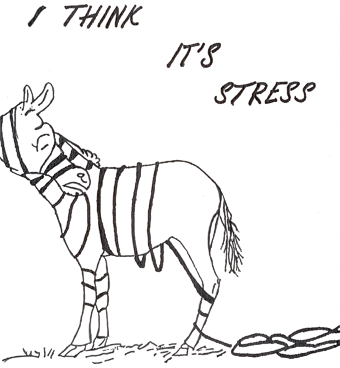|
|
Stress and tension, words we are all familiar with. We all know what they are and how they feel. What we need, is a way to combat the effects.
Stress in inherent in every form of life; it is the force exerted by any one thing against another. A person could not maintain an erect posture without the tension of opposing muscles that balance each other and keep the skeletal system erect.
We are not concerned with such essential stress or tension, but with undesirable, excess tension which threatens the body's well-being.
Webster's description of stress is; A physical, chemical, or emotional factor that caused bodily or mental tension and may be a factor in disease causation - one of bodily or mental tension resulting from factors that tend to alter an existent equilibrium.
This tension will create a stiffness, or tightening, of the muscles and the Connective Tissue beyond the amount of tonus needed for healthy function. Its origin is mostly, and possibly entirely, emotional in nature. When released, we normally experience a surge of heightened energy.
Stress pervades every aspect of modern life.
Bereavement, depression, divorce, job loss or the task of caring for a seriously ill person, are the most serious of stresses. Our daily pressures; school, balancing work, family, marriage, children, parents, finances, changes in lifestyle, social expectations, diet, exercise... can be stressful as well.
The simple matter of walking to your car late a night, or almost having an accident, can be very stressful. Remember the "fight or flight" response -- the moment your adrenal glands kick in adrenaline rushes into your blood stream increasing your heartbeat, your blood pressure goes up, breathing becomes rapid, muscles tense for rapid action and/or movement, and so on.
Clearly, stress is a natural occurrence in all our lives. Our bodies are equipped with the ability to respond to stressful situations, and then to relax when the emergency is over.
If there is no relief or ‘vacation’ from the tension, our difficult experiences or sudden tense situations accumulate the stress and can give rise to any number of disorders; Ulcers, allergies, asthma, high blood pressure, colitis, TMJ, bruxism, headaches and muscle spasms. We may be unable to cope with certain situations or think clearly. We may be irritable, moody, emotional, short tempered, fatigued or worn out, as well as unable to sleep.
Continual triggering of the stress response causes wear and tear on the body. We may not be conscious of the effect stress is having until we are confronted with an ailment.
Again, everybody experiences stress some times and this is normal. However, because the chemical hormones that are released
during stress - adrenalin and cortisol which releases stored energy from our muscles, speeds
up the heart rate, increases the blood pressure, constricts the arteries, increases the breathing rate and shuts down metabolic
processes such as digestion and immunity - we can see how problems can occur when we
are in a 'never-ending' state
of stress. * Studies have shown that even animals under chronic physiologic stress go on
to develop heart disease. * |
||
|
|
